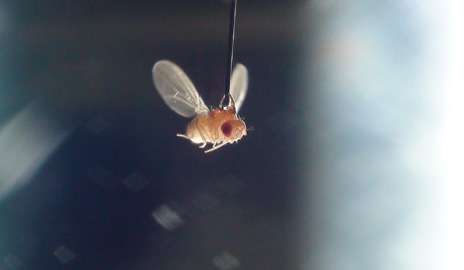Credit: Srinivas Gorur-Shandilya
(Medical Xpress)—The sense of smell remains a mystery in many respects. Fragrance companies, for instance, know it is crucial that chemical compounds in perfumes reach nostrils at different rates to create the desired sensory experience, but it is has been unclear why. Yale researchers decided to interrogate the common fruit fly for answers.
The team of Yale scientist Thierry Emonet, his postdoctoral associate Carlotta Martelli, and his colleague John Carlson systematically recorded both the stimulus reaching the fly and the responses of individual neurons over time. They found that the timing of neuronal response was independent of the concentration of the odor in the air, which in theory might help flies track fluctuating odor stimuli. However, the timing of neuronal response did depend on the identity of the odor.
Different odors elicited tiny delays in neural response. Such odor-dependent delays could be useful to the brain processing complex scents, say the scientists. The research also shows that specific interactions between odors and surfaces can affect the timing of the stimulus and therefore neural response.
Emonet says the findings suggest the world of smell is like music, in which chemical compounds of the scent act as notes and enable recognition of specific odors depending upon when they are played, or processed. For more information on the research, see the April 9 issue of the journal Neuroscience.
Journal information: Neuroscience
Provided by Yale University




















